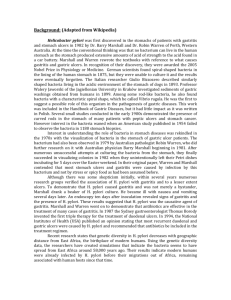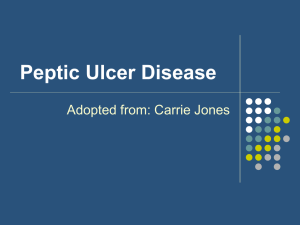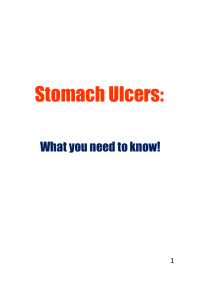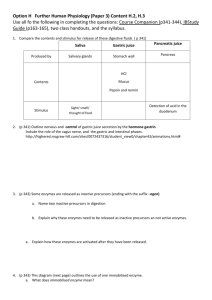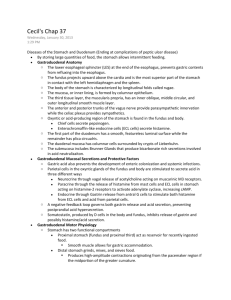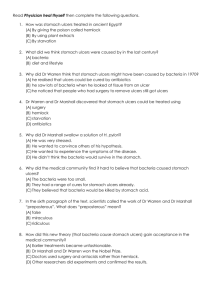Helicobacter pylori - Agent of gastric ulcers
advertisement
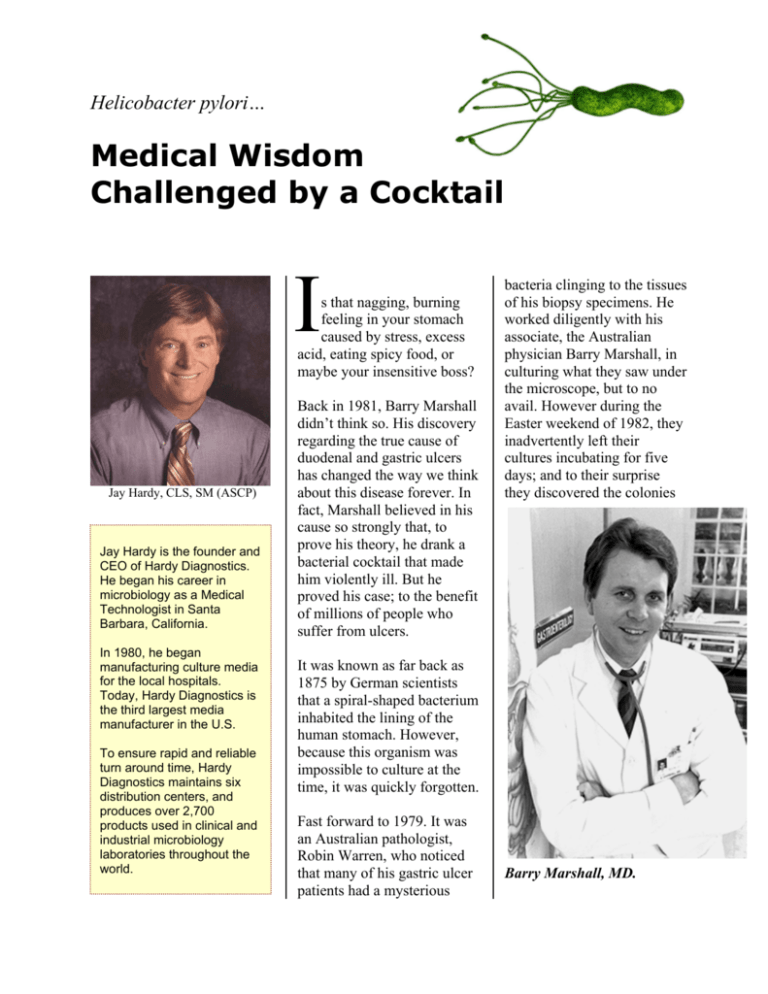
Helicobacter pylori… Medical Wisdom Challenged by a Cocktail I s that nagging, burning feeling in your stomach caused by stress, excess acid, eating spicy food, or maybe your insensitive boss? Jay Hardy, CLS, SM (ASCP) Jay Hardy is the founder and CEO of Hardy Diagnostics. He began his career in microbiology as a Medical Technologist in Santa Barbara, California. In 1980, he began manufacturing culture media for the local hospitals. Today, Hardy Diagnostics is the third largest media manufacturer in the U.S. To ensure rapid and reliable turn around time, Hardy Diagnostics maintains six distribution centers, and produces over 2,700 products used in clinical and industrial microbiology laboratories throughout the world. Back in 1981, Barry Marshall didn’t think so. His discovery regarding the true cause of duodenal and gastric ulcers has changed the way we think about this disease forever. In fact, Marshall believed in his cause so strongly that, to prove his theory, he drank a bacterial cocktail that made him violently ill. But he proved his case; to the benefit of millions of people who suffer from ulcers. bacteria clinging to the tissues of his biopsy specimens. He worked diligently with his associate, the Australian physician Barry Marshall, in culturing what they saw under the microscope, but to no avail. However during the Easter weekend of 1982, they inadvertently left their cultures incubating for five days; and to their surprise they discovered the colonies It was known as far back as 1875 by German scientists that a spiral-shaped bacterium inhabited the lining of the human stomach. However, because this organism was impossible to culture at the time, it was quickly forgotten. Fast forward to 1979. It was an Australian pathologist, Robin Warren, who noticed that many of his gastric ulcer patients had a mysterious Barry Marshall, MD. growing upon their return from the holiday. When they described their discovery and challenged the thought that ulcers were caused by stress and spicy food, they were met with skepticism and criticism from the medical community. After all, it was well known that no bacteria could ever survive the strong acid environment of the stomach. Several research groups confirmed the Warren and Marshall hypothesis and identified the bacteria as Campylobacter pyloridis, now known as Helicobacter pylori. THE BACTERIAL COCKTAIL Frustrated by not being taken seriously by his colleagues, Marshall drank a cocktail consisting of a beaker full of H. pylori in a broth solution. He became seriously ill several days later with nausea and vomiting. An endoscopy ten days after inoculation revealed inflammatory signs of gastritis and the presence of H. pylori. These results proved that H. pylori was the causative agent of gastric ulcers and not just a bystander. Marshall and Warren went on to show that antibiotics could be an effective in the treatment of this infectious disease. H. pylori shown attached to the gastric mucosa. Medical dogma can be stubborn, and it wasn’t until twelve years later, in 1994 that the National Institutes of Health in America published an opinion stating that most recurrent duodenal and gastric ulcers were caused by H. pylori and recommended that antibiotics be included in the treatment regimen. Their genius and persistence was finally rewarded when Warren and Marshall were awarded the Nobel Prize in Medicine in 2005 for their work on H. pylori. Electron micrograph of H. pylori. Marshall describes his interest in research with this story: "When I was in medical school I was given the impression that everything had already been discovered in medicine. It must have been the way it was taught. So I never thought that medical research would be interesting, but as I did my internship ... I realized there were a lot of people who had things wrong with them that you couldn't do anything about particularly." A leading microbiologist at that time said about Marshall: "The vast majority of the medical profession, not only in Australia but worldwide, considered Barry to be a quack and really were extremely dismissive for a number of years." A gastroenterologist who was an early convert said regarding Marshall: "He was changing the world and the world wasn't seeing it." Marshall himself underplays the underdog image. "I used to have a pretty good following. Robin Hood and his merry men - we used to think of it as guerilla warfare. There were a lot of people who didn't believe what we said but they couldn't keep us quiet. I was very thickskinned." Why all the resistance to this seemingly logical germ theory of gastric ulcer disease? The pharmaceutical industry held the biggest vested interest in ulcers. At the time, Tagamet and Zantac were two of its biggest all-time profit earners. or make other drastic lifestyle changes to address the purported cause of their disease These drugs did not cure ulcers; they merely controlled the release of stomach acid, meaning that patients often needed lifelong therapy. The notion that common garden varieties of antibiotics (many of which were out of patent and so did not hold the lure of vast profits) might cure ulcers was, unsurprisingly, not high on the industry's list of priorities. Helicobacter pylori is a gram negative, flagellated, helix shaped, microaerophilic organism. It is a slow growing organism that can be cultured on Chocolate or Brucella with Sheep Blood Agar in the same microaerophilic atmosphere as Campylobacter. Volumes had been published detailing the alleged psychological causes of gastric ailments, and ulcers remained a frequently cited example of psychosomatic illness. Patients were routinely advised to seek psychiatric counseling, find less demanding employment In this environment, the possibility that the ailment was directly caused by a single microorganism that could be completely eliminated with a two-week course of antibiotics was a real threat to the status quo. As for treatment of H. pylori, Marshall noticed that many of his patients became cured, at least temporarily, after a course of Pepto-Bismol. He confirmed that the bismuth in this popular remedy was the toxic agent to this tenacious bacterium. Later, several antibiotics and an acid suppressing agent were added to the treatment regimen. It is now known that H. pylori is the most common cause of ulcers of the stomach and duodenum, accounting for up to 90% of duodenal ulcers and up to 80% of gastric ulcers. Infected persons also have a 2- to 6-fold increased risk of developing mucosa-associated lymphoid tissue (MALT) lymphoma, and gastric cancer compared with uninfected persons. TREATMENT At the present time, the CDC guidelines recommend that H. pylori infection be treated only in persons who have ulcers and not dyspepsia (stomach upset without an ulcer). It is difficult to kill the H. pylori because the place where they live in the lining of the stomach helps protect them from antibiotics. Amoxicillin and Clarithromycin are commonly used for this purpose. Metronidazole may be substituted if the patient is allergic to penicillin. Levofloxacin or Bismuth compounds may also be used in stubborn or antibiotic resistant cases. To be sure the infection is cleared, at least two effective antibiotics plus either an acid-lowering agent (proton-pump inhibitor or histamine H2 receptor blocker) or bismuth subsalicylate (Pepto-Bismol) are taken. This is known as the commonly applied “triple therapy”; or sometimes “quadruple therapy” when bismuth is added. These medicines are all taken at the same time, either 2 to 4 times a day (depending on the regimen) for 1-2 weeks. DIAGNOSIS Diagnosis of H. pylori infections can be made by three methods: Endoscopy Small samples of the lining of the stomach are taken through a tube that is passed through the mouth into the stomach. The histology test, considered the gold standard of diagnostic tests for H. pylori, can be performed on the tissue sample. Medium shows a positive (purple) reaction as a result of urea degradation creating an alkaline shift in the medium. Urea Breath Test (UBT) H. pylori infection can be detected in the exhaled breath using this special test. This test is positive only if the person has a current infection. Sensitivity and specificity of this test ranges from 94-98%. Serologic test (IgG antibody) A serologic blood test shows if a person has ever been infected. This test remains positive for years after infection and also for several months after H. pylori has been successfully treated. Sensitivity and specificity of this test ranges from 80-95% depending on the type of assay used. Immunohistochemical stain of a gastric biopsy specimen. PATHOGENISIS The culture test, can be performed using a Urea Agar medium formulated for biopsy specimens, such as Hardy Diagnostics’ Rapid Urea Medium (Cat. no. Z54). So how do these bacteria survive the harsh environment of the stomach? To colonize the stomach, H. pylori must survive the acidic pH of the lumen and burrow into the mucus to reach its niche, close to the stomach's epithelial cell layer. The bacterium has flagella and moves through the stomach lumen and drills into the mucoid lining of the stomach. To avoid being carried into the lumen, H. pylori senses the pH gradient within the mucus layer by chemotaxis and swims away H. pylori is a strong producer of urease. Above, Hardy’s Rapid Urea from the acidic contents of the lumen towards the more neutral pH environment of the epithelial cell surface. The “glue” that holds it in place are called “adhesins” which bind to membrane-associated lipids and carbohydrates and help it adhere to epithelial cells. Urease breaks down urea (which is normally secreted into the stomach) to carbon dioxide and ammonia (which neutralizes gastric acid). The survival of H. pylori in the acidic stomach is dependent on urease, and it would eventually die without the enzyme. The ammonia that is produced is toxic to the epithelial cells, and, along with the other products damages those cells; thus causing the inflammation that is so familiar to those suffering from gastric ulcers. CONCLUSION As a result of Barry Marshall’s dogged persistence, millions of people now have relief from this painful disease. This story also serves as a reminder that the conventional wisdom of the day which we hold on to so tightly may become tomorrow’s folly; often to the embarrassment of the medical industry. Jay Hardy, CLS, SM (ASCP) Santa Maria, CA
